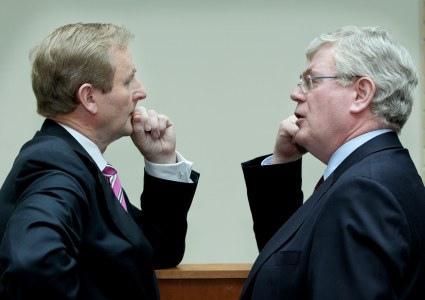This coalition is starting to make FF look good

One of the more substantial achievements of this government has been to burnish the reputation of Fianna Fáil which, we had believed, had been consigned to well-deserved oblivion by the outcome of the 2011 election. By Vincent Browne.
As the coalition resolutely persists in its ineptitude, Fianna Fáil doesn't seem that bad in retrospect.
A disapproval rating of 73% for the Government is fairly decisive. A rating (voting intentions) of 21% for Fianna Fáil is not at all decisive, but it is a significant improvement on the party's election showing (17%).
Micheál Martin is the most impressive party leader, and several of the spokesmen are capable, including Billy Kelleher, Michael McGrath, Neil Collins, Sean O'Fearghail, Willie O'Dea and Sean Fleming.
But Fianna Fáil will struggle to improve, not because of the calibre of its Dáil representation, or even the memory of the damage it did in government (although that will be hard to live down for a decade or more), but because it doesn't have enough credible candidates to win seats. The next local elections won't rectify that.
Fianna Fáil back in office might be, next time round, a little more competent than the present crowd, but essentially no different - as the present crowd are essentially no different to their predecessors.
Much of the damage to the government is self-inflicted, beginning with reckless election promises when Fine Gael feared that Labour might overtake it, and Labour thought there was a prospect of Eamon Gilmore becoming Taoiseach. Fine Gael promised there would be no increases in income tax. Labour promised it would be "Labour's way", not "Frankfurt's way", and that social welfare payments and the Croke Park deal would be left untouched.
More harm was self-inflicted by wild claims of success, such as Enda Kenny and Gilmore on the supposed deal on the bank debt in June and both of them, along with Michael Noonan and others, about growth returning to the economy.
It remains in the deep doldrums, with falling employment and, alarmingly, rising emigration. More appalling still have been the cuts seemingly targeted at the worst-off, the most egregious of the pending ones being to home help.
And then, of course, there is the James Reilly debacle.
But there has been nothing like the harm that is about to be inflicted with the introduction of the property tax. There will be outrage, some of it justified (such as in the case of those who paid massive stamp duty when buying property immediately before the collapse, and where it affects poorer people).
Most of this outrage is unjustified, because of the culture of low tax that was engendered - by Fianna Fáil in its 14 years in office, and by Fine Gael and Labour during their 14 years in opposition, during which time they berated Fianna Fáil for not indulging this culture even more.
The primary difficulty faced by this government, and by Labour in particular, is the settled conviction of much of the electorate, which Fine Gael would not wish to disturb, but Labour should want to disturb.
That conviction is manifest in part by the "certainties" that we already pay too much tax; that a large part of public expenditure is squandered on extensive social welfare fraud; that significant savings can be achieved through cutting back the number of public representatives, abolishing the Senate and slashing the pay of overpaid public servants; and that an equal society is effectively unworkable.
Nobody in politics challenges these "certainties". In particular, nobody argues for a radical redistribution of wealth and income, bar the left, which presents redistribution in terms of retribution - which, to most people, is just off-putting.
Part of the reason for this settled conviction is that our political system is driven by greed for office.
The political establishment and the media see the attainment of office as the point of politics, even though holding office does not bring the power to change much, because office-holders are constrained by the prevailing mindset of the electorate. It is through challenging and changing mindsets that power is attained, and that change happens.
It is not that politicians are universally venal, for almost all want to act in what they perceive as the national interest. But there is almost always a happy coincidence between their perception of the national interest and what it takes to gain and retain office. Throughout the boom years, nobody was going to gain office by challenging the driving force of the Celtic tiger, as people's mindsets had bought into a culture of indulgent self-interest. That mindset is now settled. Without a prolonged counter-assault on the prevailing conviction, little can be achieved or changed.
Those impatient for power have little interest in prolonging anything that will keep them from office. But in gaining office, they find that, fatally, they are constrained by that prevailing conviction and forced to do as before. Just as Fianna Fáil did - and would do now, if they were back in office.
